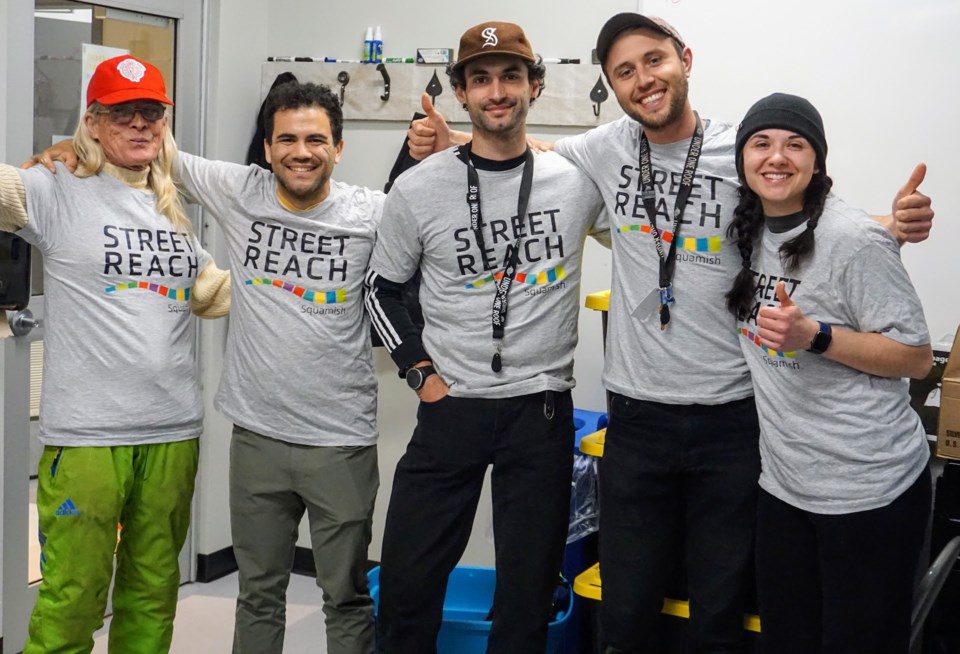Gaps in local recovery care are just one of the issues facing people struggling with substance use.
Community stigma can also play a significant role in someone’s ability to recover.
On the flip side, Jonathan Hand, a co-ordinator with the Sea to Sky Community Action Team, says having community compassion can be beneficial.
“Once someone pays attention to just another person, it's very easy to be compassionate,” said Hand, who also is the manager of Street Reach, a volunteer group that aims to build connections with those in Squamish who are experiencing homelessness.
“It's really just about what you want to pay attention to and what you're willing to be compassionate towards.”
Other compounding factors like access to safe and affordable housing, access to food or past trauma can be added weights to recovery.
“People who are homeless already are expected to be invisible,” said Hand.
“There's not a lot of campgrounds that will welcome you,” he said, adding that other stipulations like online-only or credit-only bookings create further unforeseen barriers.
These added difficulties are some of the things that Squamish Helping Hands, Under One Roof, the Overdose Prevention Site (OPS), Street Reach and the Sea to Sky Community Action Team hope to tackle in Squamish.
The Sea to Sky Community Action Team brings together numerous Sea to Sky Corridor partners — including local police, government and healthcare providers — to bring initiatives like community-wide naloxone training as well as big projects like the OPS.
“It's a supportive environment,” said Hand about the OPS. “They don't have to hide who they are and they're accepted and their safety is prioritized.”
The OPS opened in 2021, and it uses a harm reduction approach to the opioid crisis, which includes drug testing, clean supplies and staff with advanced overdose prevention training.
“In order for people to try and pivot or change, being stable is really important,” said Hand.
But, Hand reiterated that when it comes to the deaths associated with B.C.’s opioid crisis, we would be remiss to think this is only affecting demographics that experience homelessness or trauma.
“There's young people who are just experimenting with drugs for the first time — like a lot of our parents and everybody has done — except they're paying a very different price,” he said. “The supply side of these drugs is killing people in a way that is new.”
And while Hand knows that this issue is complex, we cannot forget what’s at stake, he said.
“The individual and the humanity of an individual gets lost in these conversations,” he said. “All those deaths that happen are all people. They're real people.”
“There's an individual there, like a person,” he explained, “and you can't just lump them into the broad narrative of everything. You have to consider what they have going on. And unfortunately, there's just thousands and thousands of people who are going through this crisis.”
Ultimately, this is why Hand believes compassion for everyone in the face of this crisis is so important.
“When you start feeling accepted as you are, I don't think it can be overstated the impact that can have on someone's psychology and their sense of self-worth, and how necessary that those steps might be.”
Street Reach continues to look for more volunteers, as does Squamish Helping Hands.
For more information about volunteering, please see SquamishHelpingHands.ca/Volunteer.
This article is part of an in-depth, provincewide journalistic effort by Glacier Media to examine the scope, costs and toll of the opioid and toxic drug crisis in British Columbia – a public health emergency that has taken at least 11,807 lives since 2016. If you or someone you know is in an emergency, call 911. If you need help with substance abuse, call the B.C. government's alcohol and drug information and referral service at 1-800-663-1441. It's available 24 hours a day.




(1).png;w=120;h=80;mode=crop)
